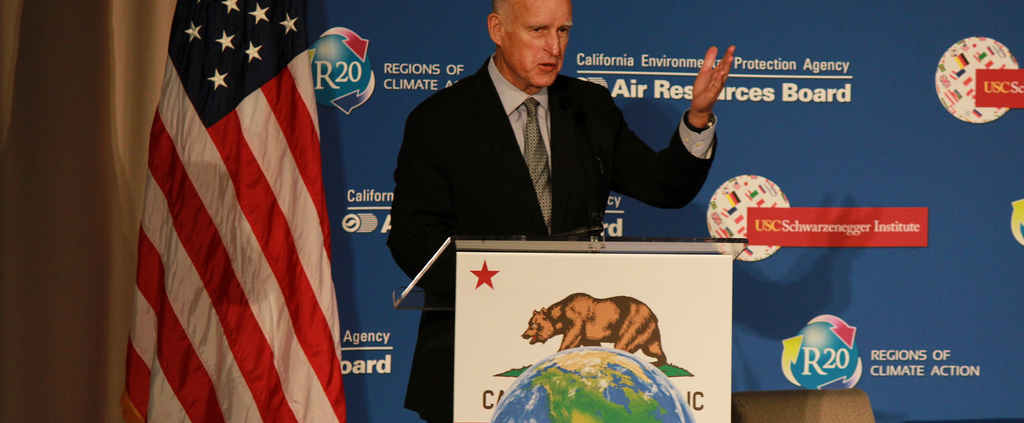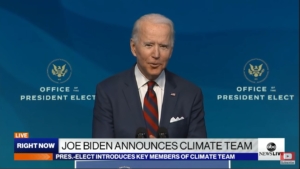California Keeps It 100, Copyright or Wrong, and It’s Crypt-on
Here’s What You Need To Know
Earlier this month, California Governor Jerry Brown signed into law SB 100, the country’s most aggressive, and somewhat controversial, climate bill. SB 100 mandates that the Golden State generate 100% of its energy from emissions-free sources by 2045. Along with this bill, Governor Brown also signed an executive order for the state to achieve carbon-neutrality by that same year and negative greenhouse gas emissions thereafter. California’s approach to state-driven climate policy will be the framework for other states to follow suit, so understanding what’s happening will be imperative for policymakers and business leaders going forward – whether they have a California address or not:
- How Did We Get Here? California has long pushed policies to address climate change, already having met a goal to achieve 1990 level greenhouse gas emissions by 2020. However, fueled by anger at President Trump’s environmental policies, the state has taken on an even-higher profile from fuel efficiency standards to clean air policies. While other states and cities have also enacted 100% renewable energy goals, California is the world’s fifth largest economy and its climate policies are considered a bellwether for economic growth, meaning that the regulatory framework underlying SB 100 could find itself applied elsewhere.
- What Challenges Are There To Implementing This Policy? SB 100 is the “most ambitious clean energy goal in the country,” and there are a number of obstacles to its successful implementation, particularly as it relates to the gap between today’s technology and that needed to make these clean energy goals a reality. For example, while California has mandated that utilities install energy storage systems to store extra solar power derived when the sun is shining, these solutions are still developing, pointing to a large renewable energy gap for the foreseeable future that will likely increase the cost of energy for residents as utilities pass on the added costs of complying with the law. Additionally, the state has previously opted to close its last nuclear power plant, and carbon-capture technology that could qualify as a zero-carbon resource has not yet achieved widespread use, further raising concerns that energy costs will balloon and become less reliable.
- How Have Environmental Activists Responded? Natural gas and other fossil fuels will remain a core component of reliable energy for the state, which may be part of the driving force behind environmental activists who have criticized and protested Governor Brown as not going far enough with his climate change agenda. Fair or unfair, the message is clear: regardless of reality, existing technology, and steps for cleaner, more efficient energy, environmental activists cannot be appeased or satiated unless fossil fuels are eliminated in their entirety. This is an instructive lesson for policymakers and corporate leaders exploring ways to make concessions to environmental activists in the hope they will lessen political and reputational pressure targeting them and their interests.
Although just signed into law, SB 100 has other states such as Massachusetts, New York, Oregon, Washington, and Pennsylvania already making plans to follow California’s lead. The Golden State’s push for ambitious emissions-free energy shows that local and regional leaders are ready to take policy issues into their own hands, and today’s age of heightened environmental activism increases the likelihood that state-driven climate policies will be more than simply a California issue – which should give companies an incentive to engage in public policy debates in their states now so that they will be prepared for attempts by policymakers and activists to implement their own climate agendas.
News You Can Use
COPYRIGHT OR WRONG?
Subscribe to Receive Insights
"*" indicates required fields
The European Union this month passed a controversial copyright law, and the fallout from the new directive suggests that passing the measure may have been the easy part. In particular, critics of the law say that it “would normalize censorship and restrict internet freedom” by preventing users from being able to post content such as links, memes, and “snippets of music and film” that have generally been protected as fair use. It would also make platforms like Facebook and YouTube directly liable for the content they host, rather than the individual users, and make those companies compensate the publishers and creators of content if it is shared on their platforms.
Further, critics of this heavy-handed approach argue that the result will be widespread censorship as platforms apply automatic filters to takedown content that could violate the new directive. Whether right or wrong, the EU’s copyright law marks a new frontier in tech regulation, raising questions about how U.S.-based Big Tech will adapt and how imperfect technologies to block and hinder protected content – used by the companies themselves – will impact free speech, competition, and the open sharing of ideas and viewpoints.
WHEN AIR BECOMES REGULATION
Dubbed the “pollution police,” sensors are being attached to Google Street View cars that measure air pollution. While it started as an experiment in Denver four years ago, Google has now expanded this operation to 50 cars across cities in the U.S. and the world – which will help lead to a more robust dataset than ever before. When measured, pollution is often only measured in a few locations per city, a troublesome fact as levels can vary within the span of a single block.
Google plans on sharing its pollution data publicly and give access to researchers and cities, allowing them to “understand where that pollution is and who it’s affecting, and then really be able to take action,” which could mean that this new data will be used by policymakers to justify more regulations, or used by activists to pressure companies and governments. If Google’s program is successful, drivers, businesses, builders, and homeowners should be prepared for the environmental regulations that may follow and the associated costs that may come with it.
FOIA FOR SECRET BALLOTS
Across Michigan, local clerks are working to fulfill a request from the out of state United Impact Group LLC under Michigan’s Freedom of Information Act seeking ballot and voting data from the 2016 presidential election. Last month, the state Attorney General’s office deemed such information to be “open record,” meaning that voter names and addresses will be turned over to the group, prompting concern from some fulfilling the FOIA requests that United Impact Group may be able “to match envelopes to ballots to be able to determine who voters voted for.”
United Impact Group, which was discovered to be a part of Democratic super PAC Priorities USA, says the request will help “inform and bolster future voter right protections” and be used for future lawsuits against voter identification laws. This example serves as a reminder that public records requests provide actionable information that can be leveraged to provide an information advantage, and more importantly, that submitting and analyzing FOIA requests are a crucial tool for achieving objectives in the political, policy, and business environments.
IT’S CRYPT-ON
Earlier this year we portended a “coming worldwide crypto[currency] crackdown,” and a recent ruling by a federal judge suggests that greater regulation is indeed on the way. While top Securities and Exchange Commission (SEC) officials have pledged “to crack down on fraud in the virtual coin market” and make so-called initial coin offerings (ICOs) subject “to the same laws the agency uses to regulate stock offerings,” the judge’s ruling applying securities regulations to cryptocurrency investment products is the first time a federal court has weighed in on the matter.
The broadening of existing SEC laws to be applied “flexibly” to ICOs has generated criticism from stakeholders in the cryptocurrency industry, which will increase the pressure for Congress to create statutory clarity for ICOs directly. When it comes to the early stages of constructing a crypto regulatory framework, one thing is clear: it’s crypt-on.



